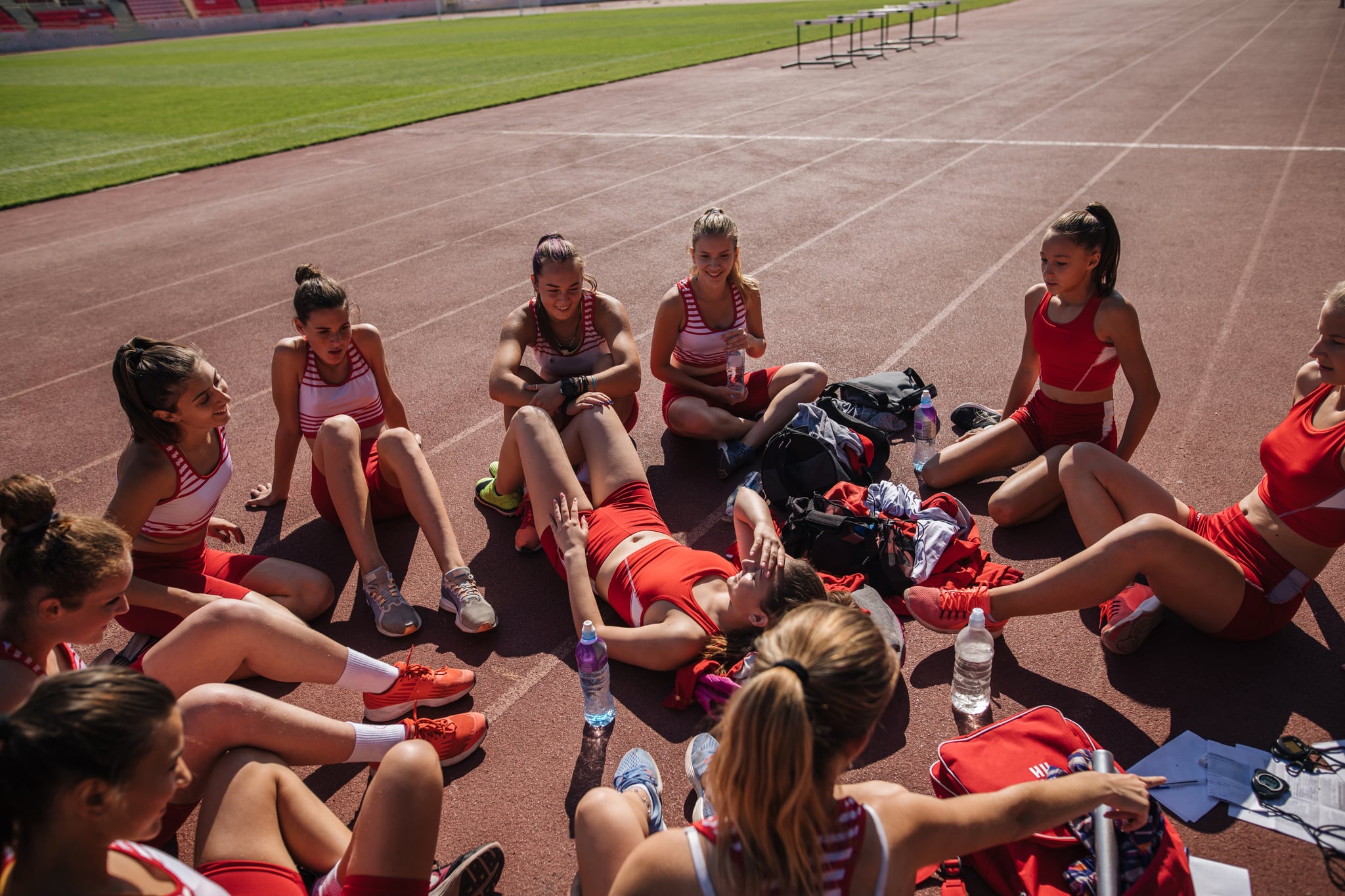
Over the past few years, the conversation around period care in sports has gone from a complete whisper to a quiet hum. We’ve seen pro athletes openly talk about managing their cycles while staying active; coaches have synced workouts with players’ cycles; and some teams are even beginning to ditch white uniforms, so athletes can feel more comfortable when they compete.
Although the sports world has made strides with destigmatizing this topic, there is still a long way to go — particularly for young athletes. Consider this: data suggests nearly 51 percent of girls drop out of sports by the end of puberty, due to concerns over their periods. That’s a huge detriment, seeing as other research shows that adolescents who participate in sports report higher levels of self-esteem and confidence.
“Periods are not embarrassing.”
To take one more step towards normalizing this conversation, for athletes and otherwise, POPSUGAR chatted with two college students about training during this important cycle phase: McKenna Dickson, an athlete on the Louisiana State University Tiger Girls Dance Team; and Cassidy Thibodeau, a player on the University of North Carolina Field Hockey Team.
“Periods are not embarrassing,” Dickson says proudly. “They are something we seem to get embarrassed about, or feel that we shouldn’t talk about. But it’s a normal thing, and we just need to use that time to take care of ourselves and listen to our bodies even more.”
Thibodeau agrees, adding how beneficial it can be for athletes to discuss their periods: “I think that it’s not talked about enough how much the different stages of our cycle can affect our performance, and that there are so many ways to optimize performance and well-being of female college athletes by taking this into consideration,” she says.
Here, Dickson and Thibodeau share some tried-and-true ways they support their bodies during their periods, especially in the midst of hard-core training.
They get ahead of symptoms
“It definitely is very individualized, because everyone is different,” Dickson says of managing your period. As an athlete, she’s found that really tuning in to what her body needs, planning accordingly, and being proactive has made all the difference.
“The main tip I’d have is to stay ahead of it, instead of waiting and then feeling miserable and trying to catch up,” she says. For Dickson, that means taking an over-the-counter pain reliever 30 minutes to an hour before practice; it helps her minimize the pain of cramps. As she puts it, “It all comes with knowing your body and how your cycle works.”
Thibodeau is also a big advocate of getting strategic with training plans. “It can be tricky navigating periods while training at such a high level,” she says. “Personally, with my period comes a lot of cramps, lower back pain, and trouble with digestion,” she adds, “so I’ll spend some time before practice in the training room filling in our athletic trainers.”
They support their bodies through nutrition
As someone who experiences bloating and lethargy during her menstrual phase, Dickson gets strategic about how she fuels her body, in order to feel her best. For instance, she prioritizes eating energizing meals, including plenty of high-protein food.
Similarly, Thibodeau is extra intentional about her nutrition: “I typically aim to have balanced meals every day whether I’m on my cycle or not, but especially on my period, I will try to not only make sure that I’m eating the right things, but also that I’m eating and sleeping enough,” she says.
What’s more, Dickson says “water intake is also a very big thing, and I feel drinking more water helps me feel more energized.”
Bloating is a very common period symptom, and — as POPSUGAR has previously reported — exercise, water intake, and nutrition can certainly help.
They keep their bodies moving
Dickson emphasizes that during her period, exercise is essential. “Staying active during my period has helped me a lot,” she says. “I even try to walk as much as I can from class to class during my period, so I’m not just allowing any pain to sit with me.”
They make time for recovery
While Dickson prefers to stay active throughout her cycle, she also listens when her body asks for extra rest. “I definitely try to get more sleep if I can,” she says. “I’ll go to bed an hour earlier or take a nap if I’m not feeling great that day, then I wake up feeling much more reset.”
During her period, or, really any day after training, Dickson also loves breaking out a heating pad: “I’ll lay on one while I do my homework, and they help so much — even in general with muscle recovery.”
Ultimately, she acknowledges what she needs and takes action — rather than ignore her symptoms or dismiss the pain — during her menstrual phase or any part of her cycle. “It is so important, especially during that time when so many things are happening in our bodies, to truly take care of ourselves and put in that extra time for recovery — especially as an athlete,” she says.
Image Source: Getty / FluxFactory
